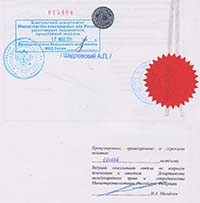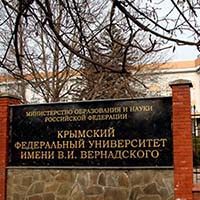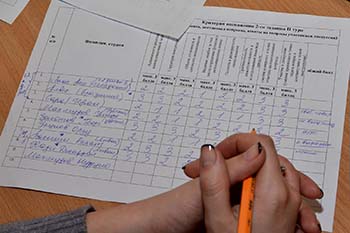
Legalization of Degree Certificates in the Russian Federation
Legalization of Degree Certificates in the Russian Federation

The legalization of a document is an implementation of a certain number of formal procedures in order to make the document legal in the territory of another country. The ultimate goal of the legalization procedure is the possibility of submitting the document, issued on the territory of one country, to the authorities of another country. Documents executed, issued or certified by Russian authorities and intended for use abroad require legalization, unless otherwise stipulated by the provisions of international agreements abolishing legalization procedure to which both Russia and the destination country are signatories. Legalization of a document is always carried out in the country in which this document was issued and / or completed.
According to Russian law, education documents obtained by a foreign national, who returns to his/her home country after graduating from a Russian university to pursue career in the chosen professional field, must be legalized or apostilled, i.e. stamped and signed by the duly authorized officials.
If you are engaged in an administrative process with official authorities and you have to submit official documents from abroad, these must be legalized to be accepted for review by the foreign country in one of the two ways depending on the country where these documents will be used:
- In countries that are members of the Hague Convention dated 5 October, 1961: the only requirement is the apostille issued by the competent authorities.
- In countries that are not members of the Hague Convention dated 5 October, 1961: the procedure of apostille does not apply to these documents, they must be legalized.
LEGALIZATION
The legalization is a certification of the genuineness of the signature and seal or the position of an official who has the authority to execute, issue, or certify a document so that a document executed, issued or certified in one jurisdiction may be recognized in another jurisdiction.
Legalization is used in countries that are not members of the Hague Convention dated 5 October, 1961. Compared to a system of apostille, it is a more complicated bilateral procedure.
Legalization is needed in order to grant your official document (for example, Diploma of Higher Education issued by V.I. Vernadsky Federal University), given to you on the territory of Russian Federation, same legal force abroad. Legalization stamp placed on the document certifies that this document exists and is official, and the people who signed it also exist and are authorized to do so.
Consular legalization is carried out by the Ministry of Foreign Affairs of the Russian Federation, which certifies the origin of the documents and their compliance with the applicable law. It is the certification of:
- the genuineness of the signature of an official who executed, issued or certified a document;
- the status of an official who executed, issued or certified a document;
- the genuineness of the seal of an official who executed, issued or certified a document.

Having the documents certified and stamped by the Ministry of Foreign Affairs of the Russian Federation, it is then necessary to submit them to the diplomatic mission for your destination country to get their stamp.
The stamp of consular legalization can be placed only on the original public documents (in our instance, they are: specialist’s degree diploma and its supplement, bachelor’s degree diploma and its supplement, master’s degree diploma and its supplement).
Copies of a diploma of higher education and its supplement also can be legalized. In such a case, legalization procedure is longer and consists of the following steps:
- Obtaining translations of the documents;
- Having them authenticated by a notary public;
- Having the documents authenticated by the Ministry of Justice;
- Legalization at the Ministry of Foreign Affairs;
- Having the documents authenticated by the diplomatic mission for your destination country.
Documents contrary to Russian law or the content of which might prejudice the interests of the Russian Federation cannot be legalized.
Document legalization is not required for the countries with which international treaties abolishing the requirement have been concluded to which the Russian Federation is a party.
APOSTILLE
The apostille is required when Russian or foreign graduates of Russian universities go abroad and submit their degree certificates issued in Russia for further education or work in any of the member countries of the Hague Convention dated October 5, 1961.
The apostille is the simplified form of legalization that ensures that your document will be accepted for legal use in all countries that have signed the Hague Convention.
The apostille attests that the official, who executed, issued or certified a document, was a duly commissioned official, and certifies the genuineness of the signature and seal of the official. Apostilled documents are legal in all countries that have acceded to the Hague Convention.
Originals of degree certificates are apostilled by the Federal Service for Supervision in Education and Science of the Ministry of Education, Science and Youth of the Republic of Crimea (11 Zhiltsovoy str., Simferopol), under the authority of the Russian Federation in education delegated to it. An applicant must personally submit an application and documents attached to it to a government authority or send a representative issued with a duly notarized power of attorney.
The processing period for authentication of degree and/or qualification certificates and making a decision on whether to place an apostille on them or not is 45 days from the date of application. http://monm.rk.gov.ru/rus/info.php?id=610231
Copies of degree certificates and their supplements are apostilled by the Ministry of Justice of the Republic of Crimea. In such a case, the process of obtaining an apostille involves the following steps:
- Obtaining translations of a degree certificate and its supplement into a foreign language;
- Having the translations certified by a notary public;
- Having the notarized translations authenticated by the Ministry of Justice (within 3 days);
- Having the documents authenticated by the diplomatic mission for the destination country.
The reasons of refusal of putting down Apostille by the Ministry of Education and Science of the Russian Federation in the Republic of Crimea:
– the document on education and (or) on qualification issued in the Russian Federation or in RSFSR doesn’t correspond to the sample of document on education and (or) qualification approved by federal executive authority in accordance with the established procedure, or the document of the state sample on education level and (or) qualification;
– in the document on education and (or) qualification even one of invoice details is absent, which should be obligatory for the moment of document issue according to the legislation in the sphere of education of the Russian Federation;
– the designated person who signed the document on education and (or) on qualification wasn’t authorized for its signing;
– the signature of the designated person and (or) the seal on the document on education and (or) on qualification don’t correspond to the samples which are available in executive authority of the Russian Federation;
– the organization provided information that this document wasn’t issued to the person specified in it as its owner;
– the organization and other authorized organizations to which the repeated request was sent, didn’t provide replies (except for cases of interdepartmental interaction);
– the organization and other authorized organizations provided information on lack of a sample of the signature of the designated person and (or) the seal.
The reasons of refusal of putting down Apostille by the Ministry of Justice of the Russian Federation in the Republic of Crimea
– the official document is assigned for representation in competent authorities of the state which isn’t the participant of the Convention;
– the official document proceeds from body, designated person, notary officer or legal entity of the foreign state;
– the official document proceeds from body which itself is authorized on putting down Apostille;
– on the document there is no signature of a person who proceeds the official document and (or) the seal of the government body, notary officer, designated person, authorized to notarial activities according to the legislation of the Russian Federation, local government and other bodies from whom the official document proceeds;
– if the corrections in the text of the official document are not stipulated with the person who signed the document;
– if the signatures and (or) seals on the official document are:
– not clear, distinct and can’t be compared with the samples that are available in central office of the Ministry of Justice of the Russian Federation or territorial authorities of the Ministry of Justice of the Russian Federation;
– if the sheets of the official document aren’t stitched and (or) not numbered, and (or) not fastened by a seal of body or the person from whom the official document proceeds.

According to subitem 48 of item 1 of Art. 333.33 of the Tax code of the Russian Federation (http://elementy.ru/Library3/NK25-3_333.htm) the size of the state tax for putting down Apostille by the Ministry of Education of the Russian Federation in the Republic of Crimea composes 2500 rubles for each document provided for confirmation. The certifying of the documents by Ministry of Justice in the Republic of Crimea has the similar cost.
Please make sure that your Russian degree certificate is legalized before you leave Russia.